It’s the night before Election Day, one week after the Philadelphia police killing of Walter Wallace Jr., and Omar Tate is calm, but resolved.
Fighting off slews of phone calls asking him to vote, reckoning with hard issues of race and justice in his city, Tate’s focus is fixed and earnest. “I am a Philadelphian, and Philly is very turbulent right now,” said Tate. “The emotion is heavy.”
The Black West Philly chef, poet, artist and activist renowned throughout the east coast for his Honeysuckle dining pop-ups – beloved as much for his inventive cuisine, as with his poetic curation of the experience and celebration of Blackness – is in pivot mode at present. Tate is transitioning his two-day experiential fundraiser with his wife, fellow writer and chef Cybille St. Aude-Tate, benefitting the development of their upcoming Honeysuckle Community Center’s brick-and-mortar outpost, Nov. 13-14 at Walnut Street Café, to a dining experience on Dec. 12, with its gala rescheduled for a date to follow. (For more info on Tate’s GoFundMe or the Walnut Street Café brunch, then gala, visit walnutstreetcafe.com.
“As altruistic that a community program and anything to benefit it is, through Honeysuckle, it would still feel self-serving if we continued asking people to give of themselves at an exact moment when they might not have that capacity – not just from a monetary position, but from an energy or an emotional sense,” he said, quietly. “How can we pay attention to something potentially, but, intangibly good, when we’re dealing with such heaviness now?”
Doing a benefit now would be irresponsible, even tone deaf by Tate’s way of thinking. “That’s not the way I’m feeling today,” said Tate. So for now, Honeysuckle – the benefit – waits for a few weeks, while Honeysuckle, the concept, lives on in the words and deeds of the Tates, and the Black community around them.
“To be frank, my family is fucked up that this happened,” said Tate of Walter Wallace Jr.’s murder, and the violent abuse Black Philadelphia has witnessed at the hands of its police. “Because of the relationship that Black Philadelphians have with the police, this is a city that could throw bottles, bricks and possibly harm police officers as a reaction to what’s going on with the palpability of emotion. As far as conversations go in regard to (Wallace’s) killing, there is no surprise. No shock. This sort of behavior has been going on forever.”
Long before he was nationally acclaimed by the New York Times and Food & Wine for Honeysuckle dinners on NYC’s Upper West Side, explaining the inspiration and history behind every dish for poetically-inscribed menu items such as “Smoked Turkey Necks in 1980’s Philadelphia,” a dish embracing his community’s being affected by the 1985 MOVE bombing, Tate was a kid who had his own run-ins with the cops.
“The first time that I was arrested, the first time that I had cuffs on me, I was 14 years old; handcuffed because I was sitting on a wall at the playground around the corner from my house at 10 o’ clock at night,” said Tate, incredulous, but laughing at the dumb severity a curfew violation warranted, the fear-inducing nickel ride given on the way to the station in the back of a police car, and the fine (“$25 my mom had to come to the station and pay”) doled out.
“If you spent your life witnessing police harassment – whether watching brutality or the more minor thing of being cuffed myself – seeing Wallace murdered… we’re used to it. It’s upsetting, but not surprising.”
Tate went on to say that he comes from a family of activists as far back as the Black Panthers, as well as having affiliated ties to West Philly’s MOVE, and is unhappy and nervous about present day circumstances between Black Philadelphia and its police. “I hope and pray it doesn’t, but this could start a war. Honestly.”
Going back to his arrest, and the Germantown of his youth, Tate wasn’t any kind-of bad kid. His childhood was great, by his estimation, and he was close to his mom, who was a single parent who owned her own home in G-Town, purchased when she was 24. The oldest of four children, Tate grew up knowing and playing with everyone on the Happy Hollow block, with the playground and its rec center as the community’s centerpiece. “I spent a lot of time there, playing basketball, learning to box. My mom taught fitness exercises there. As challenging as growing up can be for any Black person in America, my family and I had a beautiful life there looking back. Was there violence and drugs in my neighborhood? Of course there was. I just don’t want to color me or my experience as downtrodden or that I was part of a victimized community because THAT permeates the country – that feeling of helplessness. There was great beauty in my experience as a kid.”
Tate didn’t grow up wanting to be in food, so great beauty’s hold manifested itself in art and painting – even though it didn’t seem, at first, like a viable outlet.
“I didn’t see how art could make me money,” said Tate, laughing. “I went to PennCo Tech in Bristol to work on cars, BUT I wanted to paint the cars, create the look. Being a mechanic could make me some money. I worked at a Blockbuster on Cheltenham Avenue at 16. I sold some drugs too. I wasn’t good at it though.”
Tate didn’t know what to become because he didn’t understand HOW TO become something.
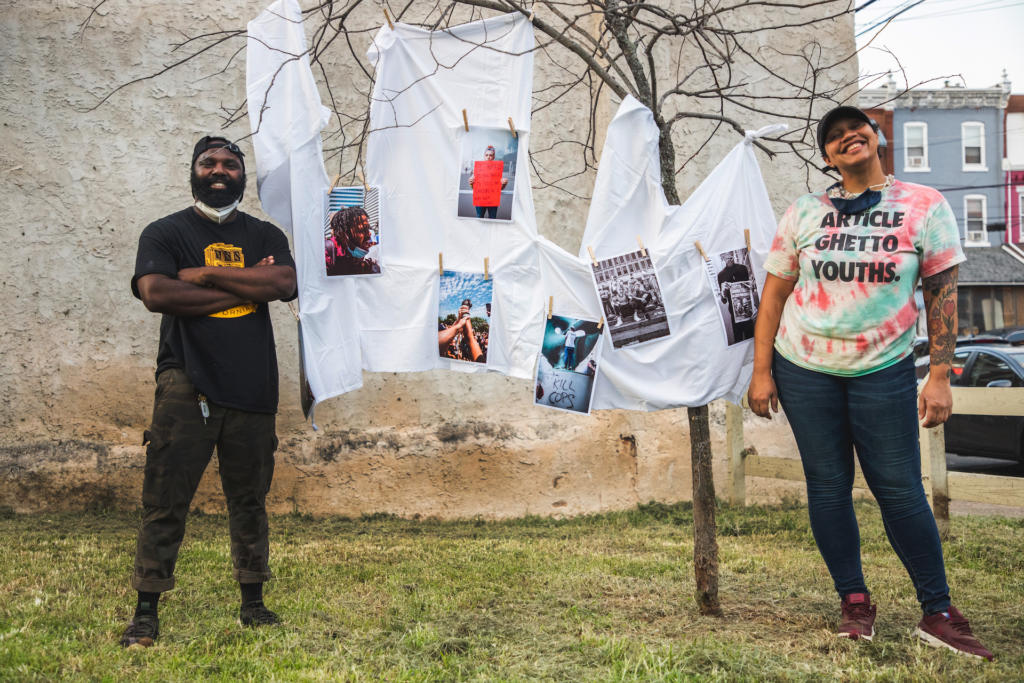
The idea of cooking popped up when Tate was out of work, selling drugs badly, and reading the want ads. “That’s old as shit, right, looking in the newspaper for a job?” Wanting a job where he could define himself rather than a gig with a label – a desire for agency in his life’s experience – Tate responded to an ad, for a prep cook, at RiverCrest Golf Club in Phoenixville. “I used my experience in hospitality as a dishwasher at the Marriott and the Rittenhouse Hotel as leverage, to lie and say that I cooked, which I never did.”
Tate giggles when talking about how quickly the RiverCrest found out he couldn’t cook. “They asked me to brunoise a shallot and I didn’t know what either of those words meant. But I had travelled over two hours each way to get to the country club so they decided to just teach me.” By the time he left the RiverCrest, Tate could work the grill station, expedite and cook – skills he took with him to other Philly-area restaurants such as Nectar in Berwyn and Fork in Old City.
Before we move to how Tate, as a chef, moved to curating every aspect of his Honeysuckle pop-ups from its Black historic, emotionally poetic, deeply literary references for menu items (ask him about his roasted yams dish inspired by author Ralph Ellison’s “Invisible Man”), to the dinner’s jazz-ambient music to the art on its walls, it’s crucial to GET how those connections even started.
For instance, poetry? He writes it, and has done so since his teen years when he was playing trumpet.
Jazz? Tate’s Instagram handle is Coltrane215, a name he gave his ‘gram when he moved to New York, and wanted something that best represented himself and his roots. Saxophonist and composer John Coltrane was a big deal in Tate’s household growing up. “We weren’t allowed to listen to hip hop or anything like that growing up,” he said. “Just R&B oldies – a lot of Stevie Wonder – and jazz. AND I HATED JAZZ AS A KID.”
As Tate got older, understanding jazz meant understanding Black America and its singular forms of expression, of its music. Whether Tate liked it or not, he began to listen to jazz as a grounding tool, part of a self-meditating process not unlike those in martial arts. “If things went out of whack, jazz settled me … Coltrane settled me.”
With that, food – Tate’s cooking, in particular – like sound, could transport those who interacted with it. Could communicate thoughts to its consumer. Cause a reaction. “I learned that so much of jazz’s vanguard was about abandoning what you think you know,” he said. “When I began this journey into cooking, I too abandoned what I thought I knew. From there, food became sound, music, even noise if I needed it to be. I was in control of its action and the reaction It could incite.”
As most diners do not think quite as conceptually as Tate might, to give his food a framework, the chef added in his poetry into each menu item’s description, as an addendum to the meal. For example, the aforementioned “Smoked Turkey Necks in 1980’s Philadelphia.” Tate laughs when he said, “Now, most guests would be like ‘why the fuck don’t you just call it smoked turkey neck? Why’s it gotta be all that?’ So, it’s right there, now, in poetic form?”
My question for Coltrane215? Is Tate Bop and blues-era Coltrane? Is he modal Coltrane? Is he raga Coltrane? Is he free and deeply spiritual Coltrane?
“I’m all of it,” he said. “I’m not speaking for all Black chefs here, but I know that a lot of them do not want to be pigeonholed making fried chicken. A lot of Black musicians don’t want to be pigeonholed and tied to the blues. I used to feel like that. But. Know what? I love fried chicken. There’s a stereotype. There’s a stigma. Fuck that. If I want to make fried chicken, I’m gonna make it. If I want to make steak tartare dressed in black squid ink to comment about blackface, I’m gonna do that too.”
Tate was, and is, looking to take you to a place with each note, or meal. But he is setting the tone for each conversation. Just like Coltrane, who set the tone, literally and figuratively, throughout his career. “Coltrane might say, we’re doing ‘Psalms,’ right now and reach for the highest spiritual place, by calling it ‘A Love Supreme.’ Or if he said, we’re doing a standard like ‘My Favorite Things.’ He wasn’t afraid of himself. I had to get over the same hump, of what people would think of me.”
Fried chicken? He’s going to do that.
Candlewood Path (An Egg Drop for John and Alice), a vegetarian broth dish paying homage to the married Contranes, as well as to his own recent nuptials? Tate is going to do that, too.
Not everything that Tate does is ever-so linear. It is, however, interconnected. “History and experience are fluid. The past is not. The past is present, and we still carry it. Something that has been difficult for Black folks in this country is the reconciliation of the past,” he said. “To intentionally forget means the thing still exists, and so we separate ourselves from history – an intentional separation.”
“The restaurant industry in Philly is more than just Max’s Cheesesteaks, DeWhite’s BBQ and Warmdaddy’s,” said Tate. “Mention Le Bec-Fin to Black people in Philly? Maybe they know about it. I know that when I was growing up, I didn’t think that shit was for me.”
– Philadelphia chef, activist Omar Tate
Another example: The title of the dish, “Chlorendi,” comes from a 1898 play by Paul Laurence Dunbar, composed by William Cook, and was conceptualized over a meal of raw beef, chopped-up raw peppers and onions and beer.
“When I read those ingredients, that sounded like a tartare to me. The more I read about the play, I realized that it challenged agency over Black existence as it was represented, then, in the entertainment industry. I also learned that the rumor that Black actors had to wear blackface during the play wasn’t true. Another challenge. I learned to not care, or be weighed down, by fact. When people are as removed as Black people from their history, we’re left to imagine what our histories were.”
Tate relates this attraction to storytelling – something he first embraced in his youth – to writer Kevin Young’s “The Grey Album.” Named after the Danger Mouse album of the same name, Young’s book talks about the power of lying, and the glory of fibbing. “When I was a kid, if you lied, you were ‘telling a story,’” said Tate. “But, that is what Black people have always had to do: for survival, for recovery, for safety, for amusement.”
Quick to say that he is no academic, Tate calls himself Homer while relaying the story of the Trojan Horse. “Maybe it was a small horse, you know? Maybe Black actors had to wear blackface during ‘Chlorendi.’ Maybe not. The connections that I am building through food are less about me recovering something for myself than they are recovering something more about our existence – we were, we are, we can.”
The smarts, the soul and the spirit that Tate had for art, poetry, jazz, and food – combined with his travels throughout the South – congealed and revealed itself in his first Honeysuckle meal in November 2018 at Fitzcarraldo in East Williamsburg, Brooklyn. This Ligurian-style, Italian bistro was where Tate would make a meal with the entirety of his philosophy on display, initially based on the fact that he wasn’t seeing who he was, or what he thought, reflected in the restaurant industry of 2018. “Black, white, whatever,” he said. “I saw very framed notions of what Black food was, but, that didn’t necessarily focus on Black life.”
Tate wanted his food, his Honeysuckle menus, to resonate with the totality of what it means to be a Black man – all of his concerns and cares, as well as that of his community and their environment. The menus may have begun with poems and personal history, but blossomed so to recognize the whole of Blackness.
“It was just a meal,” he said of Honeysuckle pop-ups’ early and quick success.” Just an organic thing that was happening, and I did not realize that it would have any impact, let alone THIS impact,” said Tate of Honeysuckle’s sold-out, ticketed, 2019 array of multi-course event dinners in New York, and the sort-of national press recognition he would receive.
“It’s weird, though. It’s only lately that I have to explain this is a thing, which means that it’s no longer organic. I don’t want it to be formulaic. I didn’t want it to be formulaic. In fact, the gala and the dinner we cancelled for this weekend was going to be the first time since March – since the pandemic started – where I would be making food in that manner. Since COVID, everything I have cooked has been straight-forward: grilled fished, fried okra. Matter of fact. And that too has felt great.”
Through the pandemic, Tate learned that simple preparation means as much as grander proclamations within his culinary statement. “I’m coming to grilled fish with the same brain that I came to those other dishes.” When he says that doing more basic dishes is like playing “Take the A-Train,” Tate means that playing the favorites is as joyful and rewarding as tucking in to the deep cuts, and the rare B-side.
One of the places that Tate had a chance to show off his simpler, still gorgeous dishes was at the start of the COVID-centric pop-ups hosted at South Philly Barbacoa, and curated by Cristina Martinez and Ben Miller. Speaking to his interaction with the Italian Market restaurateurs, Tate – who after the pandemic initially started working for Caviar and selling poetry online for money – was reluctant, but drew upon his (then) new-found taste for simpler preparations. “In a word, Cristina and Ben were generous. More than generous.”
After talking about the Martinez-Miller marrieds with such tenderness, Tate joked that his experience cooking for and with other chefs in Philly aided him, helped make him the chef that he is today. “Did I love being called a ‘dickhead,’ for how I made beets? No. Did it make me improve how I cooked beets? Yes. Maybe that’s Stockholm Syndrome. I don’t know. I just know that I want to do the right thing going forward.”
“I’m not speaking for all Black chefs here, but I know that a lot of them do not want to be pigeonholed making fried chicken. A lot of Black musicians don’t want to be pigeonholed and tied to the blues. I used to feel like that. But. Know what? I love fried chicken. There’s a stereotype. There’s a stigma. Fuck that. If I want to make fried chicken, I’m gonna make it. If I want to make steak tartare dressed in black squid ink to comment about blackface, I’m gonna do that too.”
– Philadelphia chef, activist Omar Tate
Ask him if this city knows enough about other Black chefs such as Sylva Senat, Elijah Milligan and Aziza Young, or Black restaurant entrepreneurs such as Kevin Parker and Ilisha Sampson, or Black-owned communal efforts whose goal is to help those in need of food such as The Mama-Tee.com Community Fridge, and Tate said it is all just business as usual when it comes to local diners and other Philly food writers. “The media doesn’t care until something tragic is happening,” he said. “All of the celebration of Black culture in this city isn’t happening because it was suddenly ‘A HA. BLACK PEOPLE.’ It happened because traumatic things occurred. Bad things are happening in Philadelphia. So, there is some movement to right wrongs, but, even those things aren’t getting to the root of the problem.”
The problem is, in reality, the system that marginalizes Black people, and keeps them in the shadows. The solution is for everyone to turn that system around completely, and not just write overly long think pieces weighed heavily by all manner of guilt. Another thing, according to Tate, is that Black people aren’t aware of many of the offerings that restaurants have to offer.
“The restaurant industry in Philly is more than just Max’s Cheesesteaks, DeWhite’s BBQ and Warmdaddy’s,” said Tate. “Mention Le Bec-Fin to Black people in Philly? Maybe they know about it. I know that when I was growing up, I didn’t think that shit was for me. A good night out, fine dining to me then, was Houlihan’s. I didn’t know who Suzanna Foo was until I got in the restaurant industry. There’s an invisible wall – a disconnect – and bringing Black folks across that is not the community’s work, it is that of the city. Craig LeBan could have gone into the neighborhood years ago and found good food, but he didn’t care. We, Black people, only exist when something bad happens.”
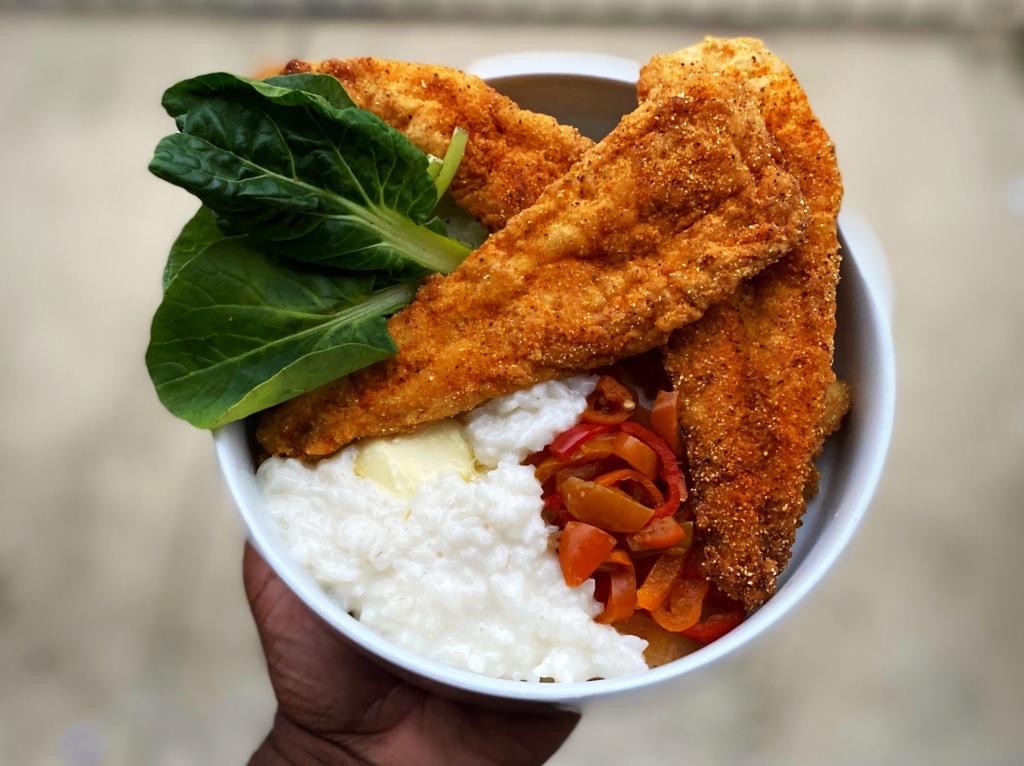
Good things happen too, spouting forth from Tate’s Honeysuckle vibe, and his outward-looking vision. That means, in a small way, that Tate, considering the healthy food options say, on Lancaster Avenue between 40th and 42nd, would playfully craft a “Chef’s Salad” for his upcoming Honeysuckle menu during December’s benefit. “After 7 p.m., after parents get home at 8 p.m., the only healthy options for the family are pizza and a chef salad. As an artist and as chef, I’m here to examine myself and the world around me.”
There is his summer marriage to Cybille St. Aude, a young chef from Long Island who cooks Haitian food (the youngest of four children, she was born in the U.S. in opposition to her Haitian-born fam) and writes children’s books. “I keep my writing separate from my food as I am establishing my identity,” she said. “But seeing how Omar makes those connections is helpful for me to think of my food and my writing in that sense.”
Cybille also already acts in tandem with Tate when it comes to building her own bridges to Haitian culture and creating menus. “I didn’t understand Omar’s Philadelphia at first, the West Philly one and its intricacies in opposition to the super-glamorized vision of the Rocky statue and cheesesteaks,” she said. “But once I got to know it, Philly’s community wasn’t so different than where I come from. I’m looking to come to terms with my own version of Philly unrelated to Omar’s. There are many historical ties between Philly and Haiti, that I wasn’t aware of until I moved down here and started digging – like the well-to-do Haitian caterers who left the island right before the Revolution and set up shop here. But, with the community center and the dinners, it’s crucial that I am plugged into Omar’s vision too.”
Also, in a bigger way, there is the very reason and vision for the benefit in the first place: Tate’s plan for a brick-and-mortar space in West Philly using the principles of Honeysuckle to explore Black culture and history, in a community center-esque fashion (The GoFundMe for the project has raised $83,330 of its necessary $250,000 goal), with food and art as its primary tools in which to examine Blackness.
“I want to take back the notion that big box grocery stores were meant to be solutions to community problems…. It doesn’t work that way,” he said. “I want people to come to our market to get things that they need, that they want, and to know they are supporting Black businesses – and not just mine, as the goal is to have 90 percent of our distribution network be Black and minority farmers, artists, makers and producers.”
During his time creating Honeysuckle and travelling through the South to do so, he discovered his Northside of Charlestown, NC, roots and the family’s connection to farming. Back home in West Philly, Tate is including like-minded (and doing) Black farming families into December’s benefit/meal/ installation and his upcoming community center in connection with BUGS, the Black Urban Growers, that collates a network of farmers indigenous to the northeast. “The challenge is to make food cost-effective for everyone involved, and affordable for your table,” said Tate.
Along with live cooking and a hearth for delicious wood-fired menu items (“also to remind people that this is how cooking started in his country: over fire”), Tate seeks to give this community center a café component that, with the moving of tables and chairs, can become a supper club, an art gallery, a lecture hall, and an activation and education space. “You’ll be supporting the Black community just by being there.”
And Honeysuckle, the name that goes beyond the community-at-large into something more warmly familial? The row home that Tate grew up in had a honeysuckle at its front step, a welcoming bush. Working backward from the present to the past, everything that Omar Tate has done has been about getting back to the bush, to home.
“There’s a clarity to what children have, and are, at the start of their life. I crave that. I’m unlearning and becoming a blank slate, as a man and as a chef. And a Honeysuckle is a philosophy, one where nuggets of truth can become a commodity – how can I make a pop-up filled with ephemeral dishes and beautiful stories into doing a grocery store? The connecting thread is Black people. Black culture. Black life.”
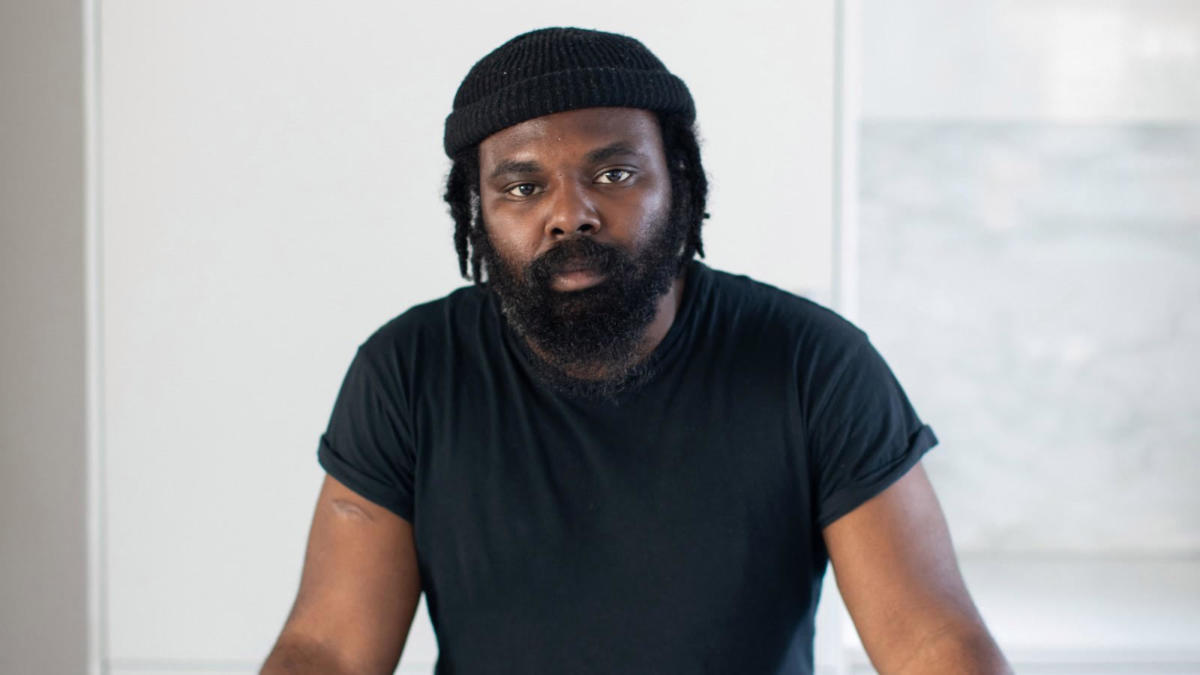
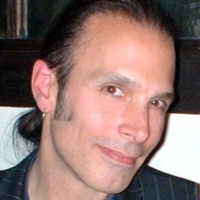
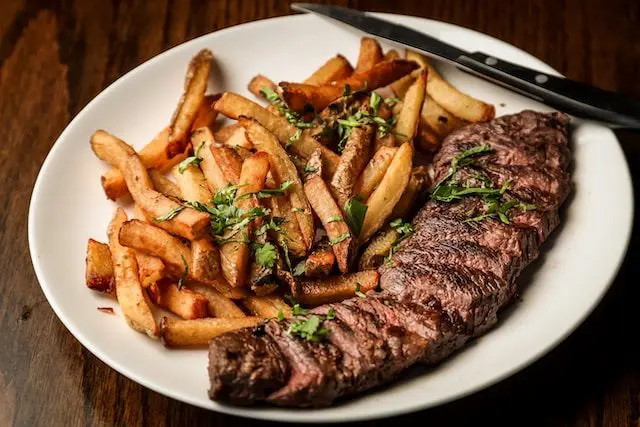
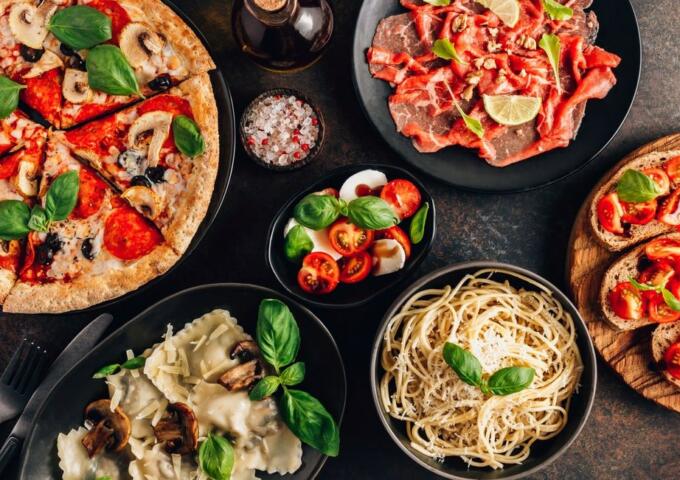
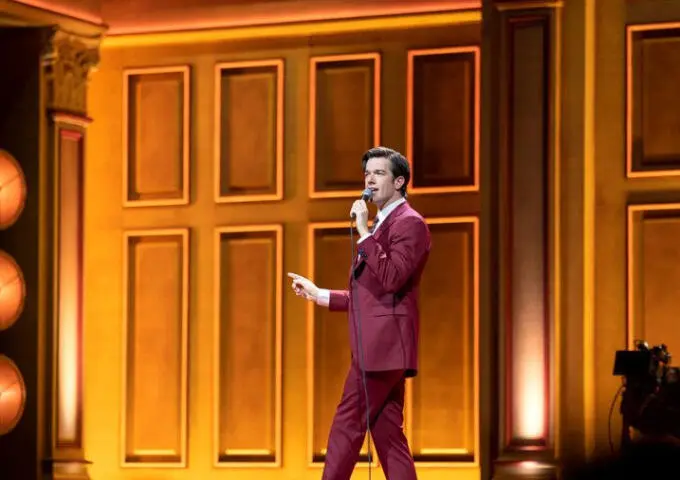
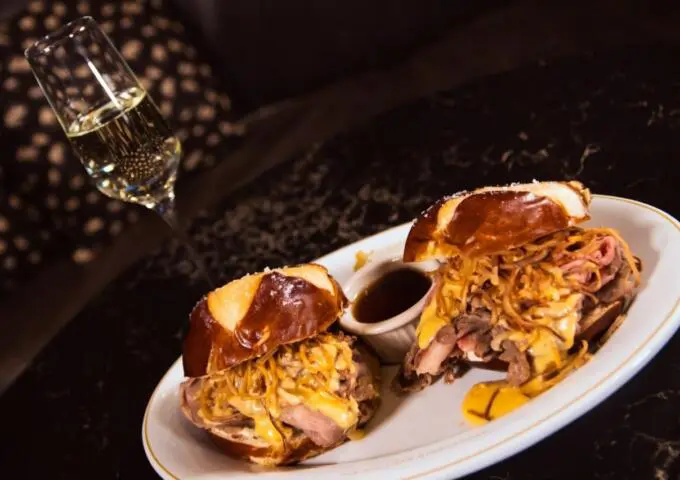
Leave a Reply